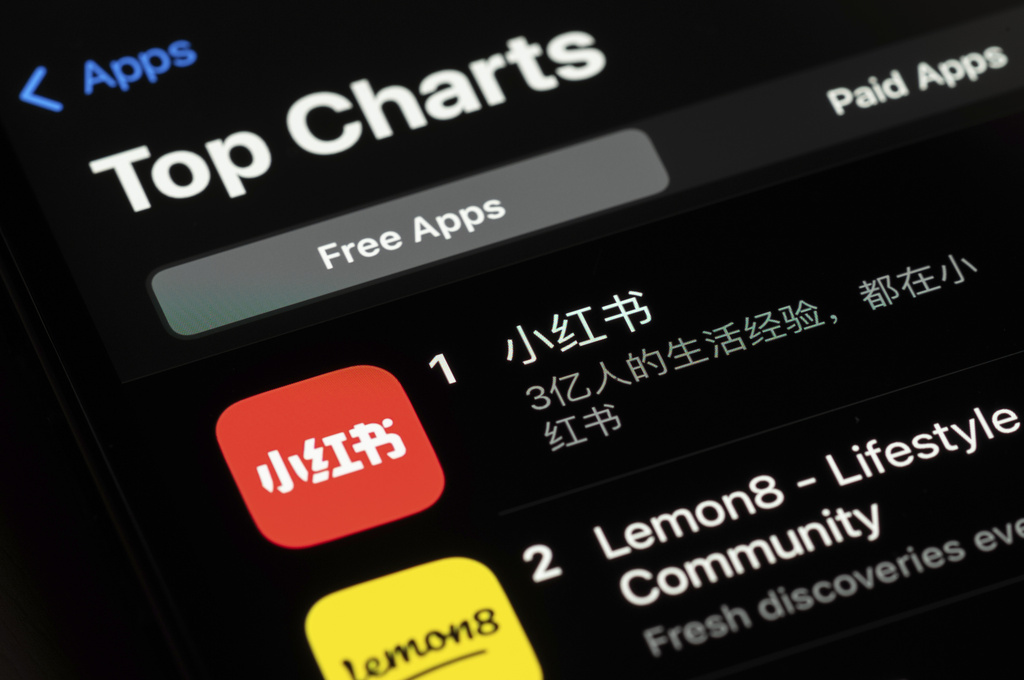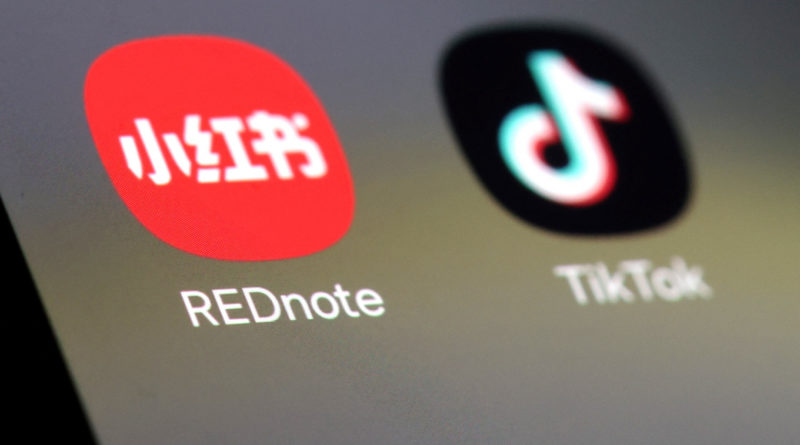CULTURE-MEDIA-TIK TOK | Chinese, U.S. users of RedNote find rare space for candid exchanges
TikTok and RedNote apps are seen in this illustration taken Jan. 15, 2025. (Reuters/Dado Ruvic)
.
Posts in recent days have ranged from the trivial to candid discussions of mental health, gender and sexuality, as well as China’s current economic downturn, that are usually heavily censored on domestic Chinese platforms such as Weibo.
..

F rom economic pessimism to cynicism about Marxism and fears over the potential for war, Chinese and American users of RedNote took part this week in rare candid exchanges that tested the limits of censorship on the Chinese social media platform. The app, also known as Xiaohongshu, or Little Red Book in China, has seen a surge of new United States users at a time of heightened geopolitical tension between the two world powers. The influx of nearly 3 million US users at the start of this week has been driven by a looming US ban on Chinese-owned TikTok, which is used by 170 million Americans, on national security concerns. The wave of American “TikTok refugees” provided China with a public relations win that state media seized upon. China’s Foreign Ministry said Beijing supports people-to-people exchanges. People’s Daily said American social media refugees had “found a ‘new home'”. “Domestically [in China], a popular narrative has emerged: the idea that Americans coming to Xiaohongshu have broken out of their own echo chambers,” said Rose Luqiu, a journalism professor at Hong Kong Baptist University. Many popular discussion threads on Xiaohongshu in recent days have touched on subjects that are normally taboo in China.
.

.
|
|
.
“I feel lost. Trying to find the meaning of life. I don’t like my job, but I need salary,” wrote one Chinese user. Another Chinese user answered a question about fears over the future: “Probably not allowed to talk about it here but a lot of us worry about the potential war [over Taiwan].” Analysts have speculated how much longer this rare loophole can stay open. The platform has been scrambling to boost English-language moderation capabilities, people familiar with the company have told Reuters. RedNote, a 12-year-old private company seen as a potential IPO candidate, has not commented on the exchanges since the number of American users surged this week. Posts in recent days have ranged from the trivial to candid discussions of mental health, gender and sexuality, as well as China’s current economic downturn, that are usually heavily censored on domestic Chinese platforms such as Weibo. China controls the internet through a system known as the “Great Firewall” and social media posts are routinely censored when deemed detrimental to national interests. Foreign social media networks such as Instagram and X are blocked, a system that has created a captive market for domestic alternatives. One English-language post on Xiaohongshu asking Chinese people about their mental health attracted more than 4,000 comments before it was taken down Friday. “As an undergraduate who has just graduated, my peers are worried they can’t find a job or are oppressed at work […] in my high school, suicides happen every year,” wrote one user. Rush Doshi, an expert on China and a former senior Biden administration official, wrote on X that RedNote had become “almost a tunnel under the firewall to reach PRC citizens directly,” a development he said poses a challenge to Beijing.
.

A social media influencer films a video for his new Xiaohongshu, also known as RedNote, after leaving TikTok in Times Square in New York City, the United States, on Jan. 16, 2025. (Reuters/Brendan McDermid)
.
|
|
.
Despite the candour to be seen in some areas, some US users complained on X of being unable to view certain content or having account restrictions after posting about politically sensitive topics, including LGBT issues. “Americans are used to very clear and transparent rules, and they cannot accept the censorship system within the Great Firewall,” wrote former WeChat politics blogger Lao Zhou Heng Mei on X, adding that this was a “honeymoon period” for American users. Chinese users said they were aware the candid exchanges may be short-lived. “If there really is a force majeure that cuts off our contact again, we must remember our love and trust in each other at this moment,” read one message widely shared on the app in English and Chinese. “And in the future if there are defamatory insults against each other, we can firmly say to ourselves: ‘what we saw is not like this.'”
.
|
|
Laurie Chen (Reuters)
Beijing
Sat, January 18, 2025




 Memento Maxima Digital Marketing
Memento Maxima Digital Marketing






